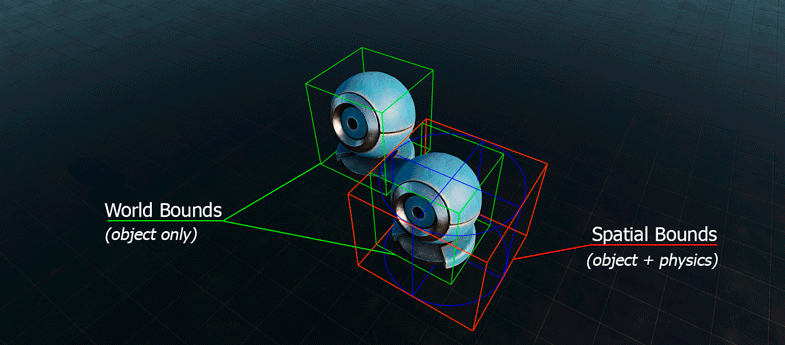Bounds-Related Classes
A bound object represents a spherical or cubical volume enclosing the whole node, used for describing node's size and location. In UNIGINE, this can be an axis-aligned bounding box or a sphere. Bounds are defined only for the nodes that have visual representation or their own size. The following "abstract" objects do not have bounds at all and therefore are excluded from the spatial tree:
- Dummy Node
- Node Reference
- Node Layer
- World Switcher
- World Transform Path
- World Transform Bone
- World Expression
- Dummy Object (if it has no body assigned)
This approach significantly reduces the size of the tree and improves performance due to saving time on bound recalculation when transforming such nodes.

The following types of bounds are used:
- Local Bounds — bound objects with local coordinates which do not take into account physics and children. Obtained via the following methods of the Node class: getBoundBox() and getBoundSphere().
- World Bounds — same as local ones, but with world coordinates. Obtained via the following methods of the Node class: getWorldBoundBox() and getWorldBoundSphere().
- Spatial Bounds — bound objects with world coordinates used by the spatial tree, and therefore taking physics into account (shape bounds, etc.). Obtained via the following methods of the Node class: getSpatialBoundBox() and getSpatialBoundSphere().
And their hierarchical analogues (taking into account all children) to be used where hierarchical bounds are required (they are slow, but offer correct calculations):
- Local Hierarchical Bounds — bound objects with local coordinates taking bounds of all node's children into account. Obtained via the following methods of the Node class: getHierarchyBoundBox() and getHierarchyBoundSphere().
- World Hierarchical Bounds — same as local ones, but with world coordinates. Obtained via the following methods of the Node class: getHierarchyWorldBoundBox() and getHierarchyWorldBoundSphere().
- Spatial Hierarchical Bounds — hierarchical bound objects used by the spatial tree, and therefore taking physics into account (shape bounds, etc.). Obtained via the following methods of the Node class: getHierarchySpatialBoundBox() and getHierarchySpatialBoundSphere().